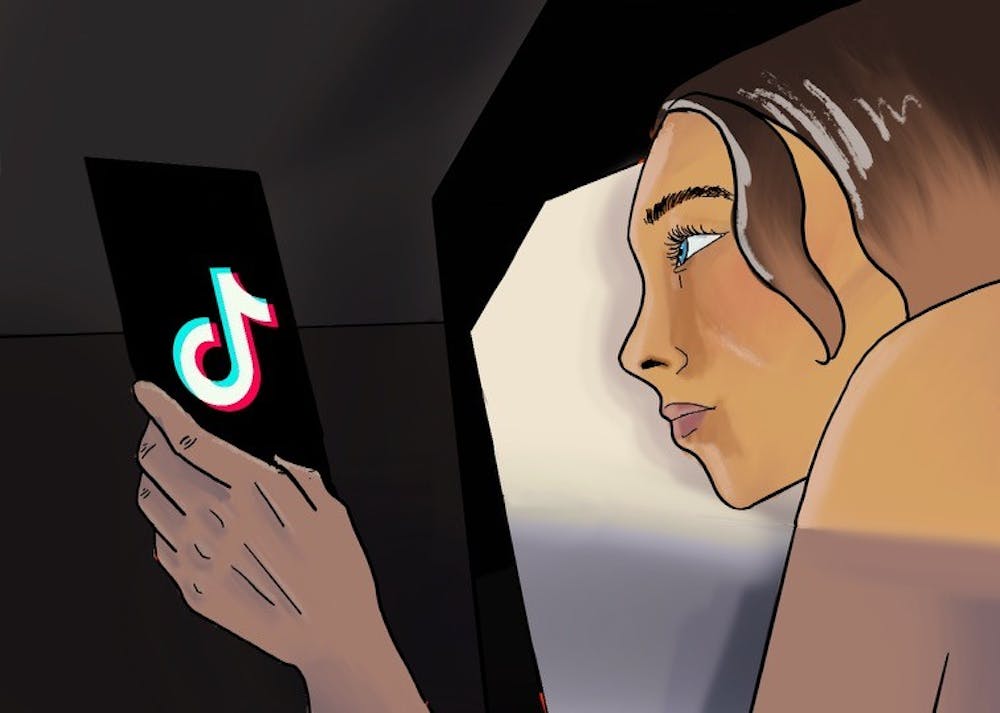Universities across the nation are banning TikTok from campus WiFi networks and devices, and half of U.S. states have blocked access to the app on government devices.
ASU has not yet imposed any such restrictions but may face pressure from Arizona's government if it passes House Bill 2416, introduced by Arizona Rep. Matt Gress, R-4, which would ban the app on state-issued devices.
Banning TikTok is, at best, an adequate response to secure data. At worst, it’s a response that risks the future of ASU student organizations and their contributions to campus vitality.
Austin Ashburn, a senior studying journalism and mass communication and the social media director for ASU’s Downtown Phoenix residential hall Taylor Place, stressed TikTok’s utility to student organizations.
“TikTok is the app where you can be the most innovative in how you market your (student organization) stuff,” Ashburn said. “TikToks are really useful in spreading the word, especially because you can be a little more quirky with them, so you can relay information in a more fun, inventive and innovative way.”
Limiting student organizations’ outreach also leads to less student involvement.
“A lot of clubs use TikTok to promote their events, and without that, it’s a lot harder to promote,” said Sophie Warnock, a freshman studying fashion and a member of Confetti, an LGBTQ+ student group on the Downtown Phoenix campus. “I definitely think that less people would know about them (without TikTok).”
Prominent ASU organizations like the Residence Hall Association and Undergraduate Student Government use TikTok to reach more students, Ashburn said. Both are known for amplifying student concerns and communicating student needs to ASU.
“They’re (RHA and USG) always really thankful whenever I reshare or repost an event that they’re hosting, especially on TikTok,” Ashburn said. “If you’re promoting on TikTok, there are more opportunities.”
RHA and USG are already popular, somewhat cushioned against the impacts of a sweeping TikTok ban. On the other hand, smaller clubs that grapple with discoverability challenges would suffer more since they lack the luxury of an established campus presence.
Yulianna Arias, a freshman studying medical studies and a member of the student dance club KoDE, testifies to its positive impact on her and other members.
“It’s (KoDE) usually just a club where you can go in there and have fun dancing to songs and they’re (dance instructors) teaching you different dances,” Arias said. “Having a TikTok page also helps spread the club itself to other people who are interested.”
Although universities fear TikTok’s cybersecurity risks, banning the app doesn’t solve our deep-rooted data privacy problem. According to the Brookings Institution, many U.S.-based companies collect and compile the exact same consumer data, but we don’t see universities booting those digital firms and their services off of campus as a result.
The only thing banning a popular app would accomplish is creating additional, unnecessary friction between students and the University. ASU prides itself on inclusion, a tenet that is central to student organizations across the four campuses, organizations that either directly advocate for the student body or provide safe spaces for students to find community. Limiting their social media impact limits the number of students whose lives could be enriched by the supportive culture of ASU’s student organization scene.
Part of inclusion is encouraging students to express themselves. TikTok is a way for students to connect with each other across campuses, bonding over similar passions and a shared identity as ASU peers. TikTok lets us do everything from spreading awareness about important social causes and sharing mental health resources to laughing over silly soundbites and participating in lighthearted trends.
Although data privacy concerns are valid, banning TikTok would not be the best route to assuage those fears or solve cybersecurity issues. All a ban would do is potentially undermine student organizations, the lifeblood of campus vitality and the reason why ASU is a home away from home for so many people.
Edited by Kate Duffy, Jasmine Kabiri and Caera Learmonth.
Reach the columnist at mosmonbe@asu.edu and follow @miaosmonbekov on Twitter.
Editor's note: The opinions presented in this column are the author's and do not imply any endorsement from The State Press or its editors.
Want to join the conversation? Send an email to opiniondesk.statepress@gmail.com. Keep letters under 500 words and be sure to include your university affiliation. Anonymity will not be granted.
Like The State Press on Facebook and follow @statepress on Twitter.




